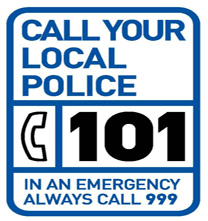Police 101
101 is the Single Non-Emergency Number in the United Kingdom which automatically connects the caller to their local police force, in a similar system to the 999 emergency number.[1][2]
Uses

The 101 service is for reporting minor and non-emergency crimes where immediate or high-priority response is not required, such as:
- To report theft of a vehicle
- To report damage to property
- To report suspected drug use or dealing
- To report minor traffic accidents
- To give the police information about crime
- To speak to the police about a general enquiry
The system determines the caller's location and automatically connects them to the police force covering that area unless the caller chooses otherwise.[1]
The emergency number 112 or 999 should be called when:
- A crime is in progress
- Someone suspected of a crime is nearby
- There is danger to life
- Violence is being used or threatened
A 101 call may be transferred to the 112/999 facilities if it is deemed to be an emergency.
All police forces maintain dedicated individual phone numbers for those who are unable to call the 101 number or who need to contact a non-local force.[3]
A textphone service is available on 18001 101 for those who are deaf, hard-of-hearing or speech-impaired.[1]
Cost of calls
Calls to 101 cost a fixed fee of 15 pence per call from landlines and mobiles, regardless of time of day or duration.[1] Vodafone UK has been chosen as the single supplier for the 101 service.[4]
History
Previously the police forces all had individual local phone numbers; the system made all police forces' non-emergency number 101.
A pilot 101 system with joint Police and local authority call centres began in 2006.[5][6] First introduced in Hampshire and the Isle of Wight for £3.3 million, the service was later extended Cardiff, Sheffield, Northumberland and Tyne and Wear and Leicester City and Rutland.[6][7][8][9]
The planned nationwide roll-out of the original service never took place and the trial itself was withdrawn from several areas after the withdrawal of Home Office funding.[10][11] In 2009, the number was instead adopted as a straightforward non-emergency number by the four police forces in Wales, with the local authority element dropped.
The number was then was rolled out across all English police forces between 2011 and 2012,[12] and extended to Scotland in April 2013.[13] The Police Service of Northern Ireland followed suit by adopting the 101 number on 24 March 2014.[14]
Criticism
The Mail Online in December 2014 and The Telegraph in October 2015 reported on problems with the 101 service: for example over one million calls were abandoned or dropped in 2013, and some callers were waiting more than an hour to get through. The Mail Online article stated "the average time taken to answer a call to Sussex Police's 101 line in June [2014] was nearly four minutes... Nearly half of forces failed to meet internal targets of answering calls within 30 seconds, according to the most recent figures". The Telegraph article stated "A senior police officer has admitted the public are wasting their time dialling the 101 non-emergency telephone number."[15][16]
Future
Similar projects such as the Missing People 116000 number; the NSPCC 116111 number; and The Samaritans 116123 number[17] are all part of the European Union's harmonised service of social value commission, who assign simple telephone numbers to freephone helplines of organisations who help citizens in need.
See also
- 999 (emergency telephone number)
- Emergency telephone number
- 3-1-1 – non-emergency number in many communities in the US and Canada
- NHS 111 – non-emergency health advice in England and Scotland
References
- 1 2 3 4 "101 – The police non-emergency number". Home Office. Retrieved 9 November 2015.
- ↑ BBC News Online (8 March 2006). "Summer launch for 101 crime line". Retrieved 2008-01-12.
- ↑ "Contact the police – Alternative non-emergency telephone numbers". Home Office. Retrieved 9 November 2015.
- ↑ Richardson, Tim (8 March 2006). "999 to get non-emergency back-up". The Register. Retrieved 28 September 2015.
- ↑ http://www.telegraph.co.uk/news/uknews/1512455/The-101-alternative-reasons-why-not-to-dial-999.html
- 1 2 http://web.archive.org/web/20070102165946/http://www.101.gov.uk/
- ↑ http://www4.havant.gov.uk/orion1/reports/exec/20080212009.pdf
- ↑ "Single Non-Emergency Number Project (SNEN)" (PDF). Retrieved 2012-10-11.
- ↑ BBC News Online (2006-05-14). "Non-emergency phone line launched". Retrieved 2008-01-12.
- ↑ "Police expand 101 non-urgent line". BBC News. 15 April 2009.
- ↑ http://web.archive.org/web/20100209040746/http://www.101.gov.uk/
- ↑ "Police Roll Out 101 Number For Non-Emergency Calls". Huffingtonpost.co.uk. 11 January 2012. Retrieved 2012-10-11.
- ↑ "101". Police Scotland.
- ↑ "New 101 number for non-emergency PSNI calls". BBC News. BBC. 14 March 2014.
- ↑ "More than a million people abandoned their calls to non-emergency 101 police number with some waiting over an hour for answer". Mail Online (Daily Mail). Retrieved 7 March 2016.
- ↑ "Don't bother calling 101 non-emergency number because 'life's too short', says top policeman". The Telegraph. Retrieved 7 March 2016.
- ↑ "Ofcom | Ofcom makes two new 116 helpline numbers available". Consumers.ofcom.org.uk. 2010-10-01. Retrieved 2012-10-11.